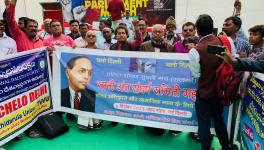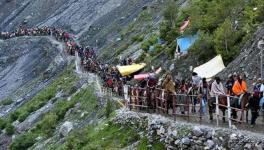Municipal Polls in 3 Cities: Little Hope for Major Changes in Urban Governance
Representational Image. Image Courtesy: PTI
Elections to the three important municipal corporations of Delhi, Mumbai and Shimla will be held in the coming few months. While the Municipal Corporation of Delhi (MCD) election would be held on December 4, elections to the Brihanmumbai Municipal Corporation (BMC) and the Shimla Municipal Corporation are expected to be held by March 2023. Administrators are governing all three municipal corporations following the delay in elections.
All three municipal corporations date back to the British era—Shimla in 1851 and Mumbai and Delhi in the mid-19th century. All of them have an imprint of British urban governance and a particular form of utility governing model.
These three cities exhibit a clear metamorphosis of urbanisation—a reverse metamorphosis of urban governance as the journey from the British period of city administration to the modern day has been very interesting. The municipal administration changed from complete control of the local bodies in utility management to many splits. Now, we often get confused about whether cities are now managed by elected bodies or parastatals that control most of the services.
The elections may result in a political change in the governance of these cities but will that also be tantamount to some of the fundamental changes urgently required in the Indian urbanisation paradigm? This is the larger question that should not be brushed aside.
Massive Demand for Urban Infrastructure
The recent World Bank report on the urban infrastructure demand in India points to the challenges that Indian cities face. It estimates an investment of around $840 billion, which is equivalent to Rs 60 lakh crore. Though the report misses the important point of the major focus on attracting private investment. The report also focuses on the dynamic process of the collection of property taxes and making them rational. However, a cursory look at the election campaign in Delhi with large hoardings of Prime Minister Narendra Modi portraying that the amnesty provided to some taxpayers is an achievement goes contrary to urban financialisation.
Planning Still with Parastatals
Likewise, all three municipal bodies scream the complete antipathy of the planning bodies—the Delhi Development Authority, the Mumbai Metropolitan Region Development Authority and the town and country planning in Shimla. None of them are planned by the city authorities. Is there any new paradigm seen in the MCD election campaign? The answer is no. Without planning being commanded by the city authorities, parastatals have been running their affairs and will continue to do so even if there is a change in the government.
Separate list for urban local bodies
The three-tier governance—centre, state and local bodies—is riddled with inherent problems. The Centre and state treat cities as their adjuncts and do not allow proper space for them to develop and flourish. The Constitution (74th Amendment) Act, 1992, enacted 30 years ago, still has not been implemented thoroughly across the country.
Ensuring sustainable urbanisation and participatory governance would require a major disruption in the current form of urbanisation. This disruption has to be in the form of a new policy paradigm that creates a Local Bodies List in addition to the Union List, State List and Concurrent List. It must be drafted and approved after a thorough discussion with all the stakeholders. This will give cities a constitutional status for both urbanisation and urban governance. Such a debate in the election campaign is completely missing.
Solid waste management
Disposal of garbage and the challenge of solid waste management also require immediate attention.
In a 2018 recent report, a parliamentary panel noted that the 65 metre-high Ghazipur (Delhi) garbage dumping site was only eight metres short of the Qutub Minar.
In the same year, the Supreme Court observed that Delhi faces an “emergency situation” due to mountains of garbage. “Will there be any person alive in Delhi in such a situation?” an angry apex court asked while seeking details of plans on solid waste management.
The issue of decentralised waste management and extending the extended producer responsibility needs to be debated. A recent study conducted on the audit of waste generated in Leh found that the top five polluters in the city were multinational corporations who have no liability whatsoever in its solid waste management.
Cities are forced to push for capital-intensive technologies and waste-to-energy solutions, which are unsustainable solutions. Decentralised waste management must be brought to the fore with proper waste audit and strategies.
Mobility
Mobility is another important area that needs urgent attention. Comprehensive mobility plans created through quantitative and qualitative data are needed. This means both the technical aspect and people’s participation must be ensured in creating these plans.
The focus on mobility of private cars and creating infrastructure for them is not a sustainable solution. The mobility in cities must be focussed on mobility of people and not cars.
Public transport, pedestrianisation, cycle infrastructure and other non-motorised forms of transport must be prioritised. However, the election campaigns of major political parties focuses on providing more parking instead of sustainable mobility. Every city even by creating more infrastructure gets further caught in the whirlpool of traffic jams, which will never end till alternative strategies are adopted.
Mobility and pollution in cities are interlinked. Better the urban mobility, lower the pollution level. Most of the pollution in Delhi is because of motorised transport. Why can we not debate whether to have a no-car day for at least once a week and see the difference it brings to the life of the common man?
Housing
Housing is another issue that is completely missing in the election campaigns. It seems that planning authorities and municipal bodies have completely abdicated their responsibility of providing decent housing to the large working population in cities.
A cursory look at the Delhi Master Plan 2041 shows that housing is no more a responsibility of the planning authority. It states that housing would be the responsibility of private players despite acknowledging that lakhs of houses are required in Delhi to cater for the growing demand. Therefore, daily wagers and others working in the informal sector cannot even imagine to afford houses. The debate over rental housing and labour hostels is completely missing in the campaigning as well.
Even if the control of these municipal bodies changes, the problems of people by and large will remain unaddressed. Without radical changes, the masses don’t have a ray of hope for better living and survival in cities.
The writer is the former deputy mayor of Shimla, Himachal Pradesh. The views are personal.
Get the latest reports & analysis with people's perspective on Protests, movements & deep analytical videos, discussions of the current affairs in your Telegram app. Subscribe to NewsClick's Telegram channel & get Real-Time updates on stories, as they get published on our website.
























